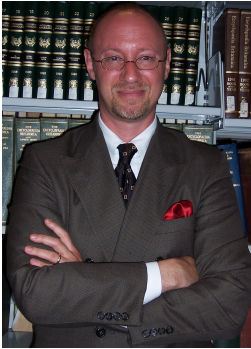Letter to the Editor: Academia should support free speech

NMSU Courtesy Photo
I vigorously disapprove of my Department of Government colleague Professor Gregory Butler’s offensive social media postings that have recently been reported in the Round Up, and which are currently under official scrutiny by the Office of Institutional Equity. However, regardless of how reprehensible I may find Dr. Butler’s past tweets, I have no choice as a card-carrying liberal—indeed, a card-carrying member of the American Civil Liberties Union—but to unambiguously support his First Amendment rights, as well as the related principle of academic freedom.
Another Government Department colleague of mine, Professor Christa Slaton, neatly poses the crucial question at the heart of this matter: “If you’re going to criticize professors for expressing their political views, are you going to go after liberals as much as you are conservatives?” Moreover, we must always be concerned over the potentially boundless censoriousness of critics on both the right and left who would seek to curtail speech they find offensive—as Juvenal asked two millennia ago (admittedly in the midst of a misogynistic rant), “Who watches the watchmen?”
Let me be clear that I am not seeking to provide any manner of moral cover for Dr. Butler, for whose social media-expressed sentiments I have nothing but revulsion. However, I believe that it is the solemn duty of the Academy to be an exemplar and bulwark when it comes to the protection of speech—all speech shy of legally proscribed incitement to violence, authentic death threats, and “fighting words.”
US Supreme Court Justice Louis Brandeis opined in the case Whitney v. California (1927), “To justify suppression of free speech, there must be reasonable ground to fear that serious evil will result if free speech is practiced. There must be reasonable ground to believe that the danger apprehended is imminent. There must be reasonable ground to believe that the evil to be prevented is a serious one.” Shy of this deliberately high bar, Brandeis asserted, “the remedy to be applied is more speech, not enforced silence.”
In the current situation, this means that students, faculty, and staff have a commensurate right to vigorously protest Dr. Butler’s offensive speech both face-to-face and via such activities as e.g. public protest and opprobrious articles, all without fear of professorial retribution.
Most fundamentally, as ACLU attorney Lee Rowland reminds us, “Our history shows the same First Amendment that protects hateful, racist speech can be and has been used by civil rights advocates to protect historically vulnerable communities.” Hence we put our thumb on the scale of justice against rhetorical malefactors at our own peril.
If it is definitively established that Professor Butler has acted in a discriminatory manner or otherwise caused one or more of his students mensurable harm in the execution of his professional responsibilities, then appropriate remedies should be rigorously applied.
But shy of such a finding, we within the Academy—faculty, students, and staff alike—are, in my view, ethically obliged to voice our unwavering support for Gregory Butler’s free speech rights and immunity from punitive administrative actions that would threaten his professorial position, while fully reserving our right to censure him privately and publicly in a manner that clearly expresses our condemnation of his odious views.
Sincerely, Neal R.
Neal M. Rosendorf, Ph.D.
Associate Professor of International Relations
M.A. Program Chair
Department of Government
New Mexico State University

Alanna Herrera is entering her fourth year at The Round Up, taking on her second year as Editor-in-Chief. She is a senior with a passion for storytelling...

Cynthia • Apr 25, 2019 at 9:45 PM
Professor Rosendorf:
With all due respect, I would have much rather learned about why you think Professor Butler’s views are offensive, reprehensible, repulsive, and odious. If we, as faculty members, are “ethically obliged to voice our unwavering support” in this free speech case, are we not equally ethically-obliged to voice our reasons, particularly to our students, why we “have nothing but revulsion” for our colleague’s publicly expressed values, beliefs, and attitudes? If not, don’t we risk providing “moral cover” for this violent and dangerous speech by omission?
Neal M. Rosendorf • Apr 24, 2019 at 10:54 PM
Many thanks to Jesse Allred for his kind words about my letter to the RU editor. Concerning the Guardian’s critical article on the survey methodology of Brookings Institute scholar John Villasenor, I would stress that the British newspaper does not provide the last word on the subject. Indeed, soon after the Guardian’s columnist published his stinging criticisms, the author of the Washington Post article I originally linked offered in turn an in-depth, point-by-point demolition of the Guardian’s analysis of the Villasenor survey, along with a cogent vindication of the survey’s methodology.
https://www.washingtonpost.com/news/rampage/wp/2017/09/28/free-speech-and-good-vs-bad-polls/?utm_term=.93d411f1366a&noredirect=on
Again, many thanks for the kind words.
Best, Neal R.
Jesse Allred • Apr 24, 2019 at 8:09 PM
Thank you for the reasoned response, Dr. Rosendorf. I agree with you wholeheartedly.
I would point out that one of your links points to a discredited study. Your statement: “Moreover, we must always be concerned over the potentially boundless censoriousness of critics on both the right and left who would seek to curtail speech they find offensive” contains a link on the word censoriousness to a Washington Post article that reports on the results of a poll that appears to show extremism on college campuses towards free speech. However, the poll was non-scientific. It was run by an engineering professor who had never done a poll before and was an online opt-in panel, not a randomized poll. A former president of the American Association of Public Opinion Polling called it “junk science” and “malpractice.”
Here is a good article describing all of the problems with the poll: https://www.theguardian.com/us-news/2017/sep/22/college-free-speech-violence-survey-junk-science
Please don’t take this as a criticism of your letter — I think it is well reasoned, well written, and well worth reading. I just wanted to clarify for other readers that things on college campuses aren’t nearly as bad as that non-scientific poll presents them.
Neal M. Rosendorf • Apr 22, 2019 at 9:35 PM
In reply to Prof. Bronstein’s post, the current Office of Institutional Equity investigation goes self-evidently beyond students’ expressions of “discomfort and revulsion in print” with its tangible professional ramifications that could potentially reach as far as Prof. Butler’s termination. And while most of the (quite justifiably) opprobrious comments quoted in the 4/15/19 Round Up article are limited to the sort of censure I advocated and indeed practiced in my letter, at least one former student has called for Prof. Butler’s summary dismissal. In my opinion that is one call too many as things currently stand.
As I previously stated, all appropriate remedies should be on the table if the OIE finds, to reiterate what to my mind is the legitimate minimum standard, that Prof. Butler has acted in a verifiably discriminatory manner or otherwise caused one or more of his students mensurable harm in the execution of his professional responsibilities. But the bar for punitive action against a faculty member who engages in offensive speech must be kept dauntingly high, as the machinery of suppression and punishment can theoretically be operated just as readily by right-wing activists and officials seeking to quash views they condemn as by their left-wing counterparts.
Those are the stakes for NMSU and academic freedom concerning the setting of a potentially dangerous precedent, and it is not too early, with all due respect for Prof. Bronstein, to sound the cautionary tocsin.